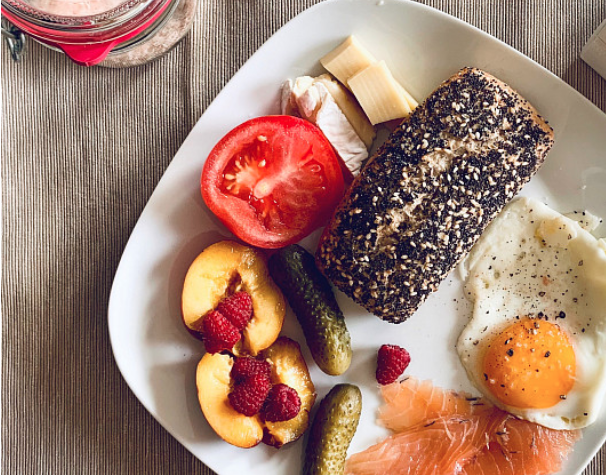How to replace protein foods during fasting

Proteins are your muscles, bones, and all the soft tissues of your body. Most of them are found in meat, tuna, shrimp, eggs, and cheese. The author of the book “Lose Weight and/or Survive”, nutritionist and fitness trainer Victoria Borovskaya claims that in order to maintain a healthy level of proteins in the body, you need to eat at least 0.8 g of protein per 1 kg of body weight.
But what about those who give up animal products? For example, you are a vegan or you observe all religious fasts every year, so do not eat meat, eggs, or fish. You may be fasting right now. The biggest danger in such a diet is protein deficiency.
How to recognize a protein deficiency and what it threatens
A lack of protein causes irreparable harm to the body, so it is important not to overlook the symptoms and balance your diet in time.
The first symptom is PERMANENT HUNGER. Many people know this feeling for themselves: food does not bring a feeling of satiety, hunger becomes uncontrollable. We are trying to quickly seize this sensation with something high-calorie (for example, sweets), and meanwhile, hunger must be compensated for with protein products.
The lack of protein over time becomes noticeable and visually: THE CONDITION OF THE HAIR, NAILS, SKIN WORSENS . Chronic protein deficiency also leads to a general decrease in immunity: the body simply has nothing to build immune cells and antibodies from. As a result – frequent colds, dermatitis, allergies. Constant weakness appears, the person gets tired quickly, there is not enough strength for anything.
In the future, a lack of protein can provoke the development of a number of diseases – for example, osteoporosis of the lower jaw. And, of course, there can be no question of any growth of muscles and connective tissue in such conditions. I believe that the more serious consequences of a protein deficiency within the framework of Lent, lasting 48 days, will not come.
How to replace animal protein
- SOY PROTEIN. Today it is the best substitute for animal protein, as close as possible to it in terms of amino acid composition. Soy protein is easy to digest. Another important plus: semi-finished soy protein products will diversify the lean table.
- OTHER VEGETABLE PROTEINS. Here in the first rows are legumes: peas, chickpeas, beans, lentils. A good percentage of protein in cereals and seeds (quinoa, sesame), in nuts. Even some vegetables and herbs contain protein: spinach, broccoli.
- PROTEIN SHAKES. I am a proponent of eating protein powders only when needed, and protein shortages in fasting are just such a case.
The abrupt transition from animal protein to vegetable protein can cause unpleasant reactions from the gastrointestinal tract. Do not be alarmed, this is normal! Fasting lasts long enough for the body to adapt. And the introduction of certain foods into the diet will help minimize intestinal discomfort.
- FLAXSEED is a popular gut calmer. With an enveloping effect, flax seeds normalize peristalsis.
- PRUNES stimulate the digestion of food, an excellent aid in constipation.
- BROWN RICE is a natural sorbent that helps to remove harmful substances from the digestive tract.
- SPINACH contains healthy fatty acids. They perfectly relieve inflammation of the gastrointestinal tract, improve digestion and participate in the prevention of gastritis.
What is at the post
I offer you the TOP products and food groups that you should definitely include in a lean diet.
- FOODS RICH IN B VITAMINS, important for the growth and maintenance of muscle mass. The champions here are salmon, mackerel, sardines. During Lent, fish is allowed on two holidays: Annunciation and Palm Sunday. I advise you not to miss this opportunity to feed on vitamins!
- LEGUMES OF ALL VARIETIES AND TYPES. Beans, beans, and chickpeas in your diet are a great way to eat your protein intake. Legumes are also rich in fiber, which is essential for gut health.
- BUCKWHEAT. Number 1 among cereals in terms of protein content: here it is 12 g per 100 g of cereals. And buckwheat is also a storehouse of usefulness, there are vitamins B1, B2, PP and E, copper, iron, calcium, manganese, zinc, and phosphorus.
- OTHER CEREALS: oatmeal, pearl barley, barley, wheat, quinoa, spelled, etc. In general, cereals are an excellent source of carbohydrates, which are essential in the diet as a source of energy.
- BANANAS. Among all the fruits, I want to highlight them especially, because bananas are rich in fiber and potassium, protect the gastric mucosa, and improve digestion. And they perfectly saturate!
- NUTS AND SEEDS: almonds, pecans, hazelnuts, walnuts, sunflower seeds, pumpkin seeds, etc. They are all excellent sources of healthy fats, micronutrients, and macronutrients.
- WATER. My universal recommendation is strong for everyone: drink enough water (one and a half to two liters for a conditionally healthy person)!
How to change your training regimen
Great Lent is the strictest of all Orthodox fasts. Given all the nutritional restrictions, it is very important to assess the strength of the body sensibly and not set yourself impossible fitness tasks at this time.
I strongly advise against setting records. You do not need large weights in strength, avoid long exhausting cardio loads. Perhaps fasting is also not the time to address fundamentally new loads. If you are doing strength training, then I recommend adjusting your training regimen: reduce weights and increase the number of repetitions.
You should not set yourself the task of building muscle mass. The most important thing with dietary restrictions – whether fasting or otherwise – is to maintain pre-existing muscle mass. Let your workouts help you keep your body in good shape – without compromising your health.